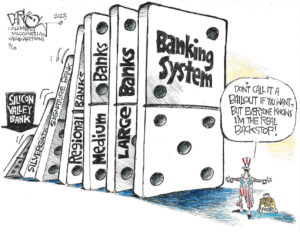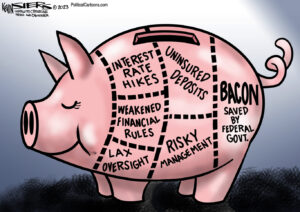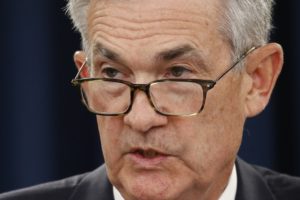Getting the Bailout Right
Unless something very strange happens, Congress will pass a massive bailout of the financial system by the end of this week simply because every other option is worse. But the content of the bailout package matters enormously.Liberal Democrats are in agony over bailing out Wall Street. Conservative Republicans are in agony over massive government intervention in what they like to call the free market. Yet neither side wants to be blamed if the financial system implodes.
It gets more complicated: An administration whose critics believe it abused the power it grabbed during a different kind of national emergency after the 9/11 attacks is asking for unprecedented authority over the financial system. Yet the man leading the charge this time, Treasury Secretary Henry Paulson, is one of the few administration officials trusted by Democrats.
All this is happening six weeks before an election whose outcome could set the country on a very different course. Both presidential candidates are wary of getting on the wrong side of either the public’s justified populist fury or its desire for prudence in the face of potential catastrophe.
The broad outcome is already in view: Unless something very strange happens, Congress will pass a massive bailout of the financial system by the end of this week simply because every other option is worse.
Rep. Barney Frank, a Democrat who chairs the House Financial Services Committee, captured the prevailing mood in an interview during a break in the negotiations on Sunday night: “What’s the alternative?” he asked.
But the content of the bailout package matters enormously. To get what it needs, the administration will have to give taxpayers more protection and more accountability.
One core doubt about this bailout is whether taxpayers will be holding a bag of dreadful investments that reckless financial mavens get to unload without having to part with their houses in the Hamptons. This isn’t just rhetorical populism: There is a moral problem for capitalism itself if taxpayers take on a burden created by the foolishness of the privileged and get little compensation in return.
A related problem is how much new spending should be piled onto a federal budget that is already in the red.
Yes, a bailout is necessary, but several steps could limit the risks. Sen. Jack Reed, D-R.I., has proposed granting the federal government warrants to acquire stock in financial firms that profit from the bailout. This way, taxpayers would share in the gain if the industry recovered — which, of course, is the whole point of this exercise.
Socialism, you say? We’re already into that. The administration’s plan amounts to socialism for the rich only. And as Reed explained in an interview, his proposal is actually more in keeping with capitalism than a pure bailout. “If taxpayers take risks, they should be able to reap some of the rewards,” he said. Frank is trying to get this provision into the final bill.
Moreover, as Reed notes, giving the government an option to have a share in companies if they succeed will protect taxpayers if the feds pay too much for a company’s bad debt. If a company prospers because it receives more than what turns out to be a reasonable market price for its debt — and the debt we’re talking about will be very hard to price — taxpayers get at least some of the money back when the company’s stock goes up.
The bottom line should be: no potential upside for the taxpayers, no bailout.
Another question: Why bail out Wall Street and not help those who are losing their homes in the subprime mortgage fiasco? Frank believes that if the government comes to hold bad mortgages under the bailout plan, it will be able to halt foreclosures. Sen. Charles Schumer, D-N.Y., wants to give bankruptcy courts the power to change mortgage provisions to keep people in their homes.
Almost everyone in both parties agrees that the final bailout bill should place real checks on the power of the treasury secretary. Such accountability provisions were a key element in a proposal offered Monday by Senate Banking Committee Chairman Chris Dodd, D-Conn. Even if Paulson proves to be a sainted and savvy steward, what about the next secretary?
And if Congress can appropriate $700 billion for Wall Street, where is the help for everyone else hurting in this economy? Isn’t it strange that an administration that could not come up with a comparatively modest sum to increase the number of children with health insurance could suddenly find all this cash for the financial industry?
Sadly, this bailout is inevitable. But it should be done right. Congress shouldn’t be bullied into passing a flawed plan that will leave the next president in an even deeper hole.
E.J. Dionne’s e-mail address is postchat(at)aol.com.
© 2008, Washington Post Writers Group
Your support matters…Independent journalism is under threat and overshadowed by heavily funded mainstream media.
You can help level the playing field. Become a member.
Your tax-deductible contribution keeps us digging beneath the headlines to give you thought-provoking, investigative reporting and analysis that unearths what's really happening- without compromise.
Give today to support our courageous, independent journalists.







You need to be a supporter to comment.
There are currently no responses to this article.
Be the first to respond.